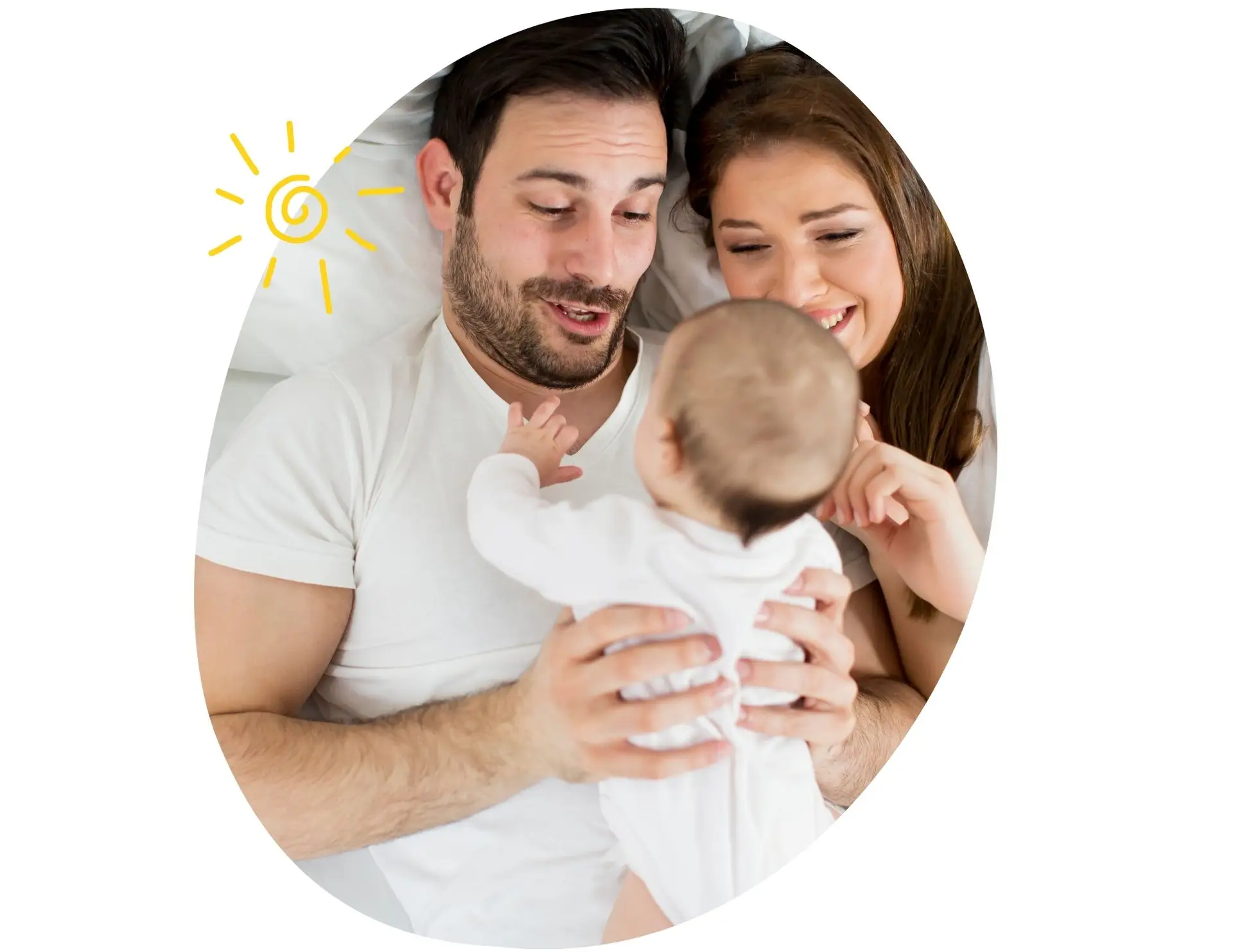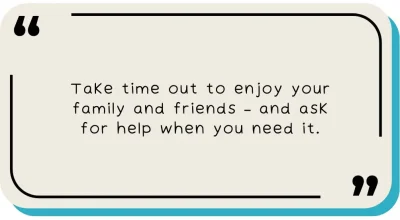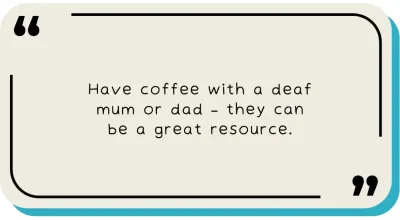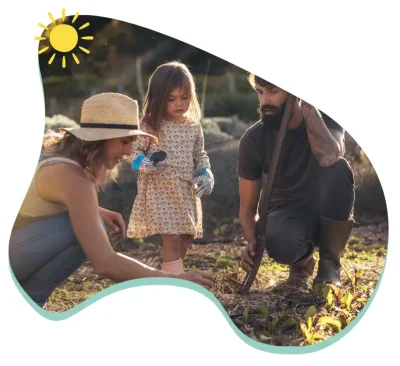You are here: Home » After diagnosis » Shared journeys, shared wisdom

If your baby or child has been diagnosed with hearing loss, we understand how you’re feeling right now. Many of us have gone through similar feelings of isolation and sadness when receiving our child’s diagnosis. It can come as a shock.
In the weeks, months, and years to come, you will discover that your child can achieve everything you dreamed of before they were born. They will smile at you, talk to you, attend school, play sports, and find a job. They will eventually marry and have children of their own. Life may not always be easy, but with your love and support, your child will grow up to lead a happy, fulfilling, and independent life.
The main goal of identifying your baby’s hearing loss early is to support their access to communication. Every cuddle, comforting touch, smile, and lullaby is a form of communication, and these moments matter. The following advice has been gathered from parents in our online support groups who have walked a similar path.
“As a parent, you have your baby’s best interests at heart. You are a natural advocate for your child and play a vital role in shaping their future.”
“Remember, this is a journey, and even the longest journeys begin with a single step.”
“Gather information from a variety of sources. When parents receive clear, unbiased information and support, they feel more confident making decisions that are right for their baby and family. While it’s important to take the time you need, try not to delay decisions for too long.”
“If you have questions, ask them, and make sure you understand the answers. Don’t hesitate to ask your baby’s doctors and audiologists to write down the key points they discuss with you.”
“Your voice matters. Speak up about your worries and concerns.”
“Keep all information about your baby’s hearing loss in one place so it’s easy to find when you need it.”
“You don’t have to do this alone. Let family, friends, and your support network help you. Sometimes asking for help is the bravest thing you can do.”
“Finally, be kind to yourselves. This is a challenging time, and it’s okay to take moments for yourselves as parents. Looking after your own wellbeing will help you be there for your baby.”
What your baby needs most from you at the moment are all those things that parents are so good at – touching, talking, comforting and loving. While there is much to learn and decisions to be made, don’t forget to enjoy your baby and settle into a comfortable routine.
You may have already started to gain some understanding of what having a baby with hearing loss involves from your doctor or audiologist. The amount of information can feel overwhelming. However, as parents, we have learnt that the more knowledge we have about hearing loss and its management, the more in control we feel and the easier it is to get on with the things we need to do for our child.
Knowledge is power. Gather as much information as you can from many different sources. Read brochures, books, articles and websites. You will find some helpful resources and others that may not be right for you. Our babies are all individuals, and our families have different needs. What suits one family may not be right for yours.

Having a baby with hearing loss affects the whole family. Your partner may have different feelings and reactions than you do. It’s important to communicate with your partner about your feelings and to be mindful of their needs as well. Sharing your thoughts and feelings with trusted family and friends can also be beneficial. Being honest and open with family and friends will help them understand that it is OK to talk about your baby and his hearing loss, which can assist you in coping with the situation. If you have other children, be attentive to their feelings and needs too.
You are the centre of your baby’s universe and should look after yourself over these next few months. Try to get enough sleep, eat healthy meals, and exercise regularly. A walk each day is good for you and your baby!
In the first few weeks after your baby’s diagnosis, it can be difficult to concentrate and ‘get your act together.’ Accept help from family and friends. We have created a downloadable flyer titled ‘Helping a Friend’ that contains useful tips and suggestions for them. Things like a good meal, babysitting, or taking your other children to school can make a significant difference, allowing your loved ones to show they care.

You and your baby will be meeting a number of different people over the next weeks and months. They are all part of a multi-disciplinary team and are there to guide and support you.
Good quality information about hearing loss and its management is so important. The more you learn—from a variety of trusted sources—the more confident you’ll feel in making informed decisions about your baby’s care and future.
Talk to the professionals in your team, connect with other parents of children with hearing loss, and don’t hesitate to ask questions. Family and friends can also be a valuable part of your support network.
Every parent responds differently—some feel overwhelmed by the amount of information at first, while others want to know everything straight away. Go at your own pace. What’s important is staying informed over time. As your child grows, things like technology, services, and policies will change—so staying up to date will help you make the best choices along the way.
There are many reliable and helpful sources of information, including books, brochures, and websites. A great place to start is Choices from Hearing Australia. You can also ask your audiologist or paediatrician for recommendations. We hope this website becomes a trusted source of information and support throughout your journey.
And remember—many parents say that connecting with other families who have children who are deaf or hard of hearing has been one of the most valuable parts of their journey. Their knowledge, insights, and lived experience can be a great source of support.

When your baby is diagnosed with hearing loss, it can feel overwhelming with so many decisions to make, especially when you are still in shock and have limited information and understanding of what the hearing loss might mean for your baby’s future.
It’s important not to rush into decisions. Taking a few weeks to enjoy your baby, settle into a routine and learn more about their hearing loss will not negatively impact their future. However, it’s crucial not to delay for too long. Ideally, your baby should have listening devices by three months, and begin early intervention by six months.
You have the freedom to choose the path that best suits your baby and your family. Make sure you are aware of all the options available before making decisions. Take the time to explore different early intervention services to find the right fit for your family. Visit these services and speak with the staff, as they will play an important role in your lives for a while. It’s vital that you feel comfortable and confident with their service.
The choices you make now can be adjusted later. What works for your child and family today might not be suitable in a few years. Decisions can be changed based on your child’s needs and preferences. The right choice is the one that works best for you and your child.

Living outside a metropolitan area presents a number of other challenges for families. You will probably need to travel greater distances to access specialist and audiological services. Issues about work, looking after other children and travelling with a small baby increase the stress for rural families. It can seem like you have just arrived back home and you must be off again.
This will improve over time. There will be fewer appointments and you will be able to attend an Hearing Australia Centre closer to home. There are some services available to you that can relieve the financial burden. Ask your doctor, audiologist or hospital social worker about financial assistance for travel and accommodation in your state.
Travel safely
Don’t drive if you are upset. It might be better to stay overnight after an appointment and drive home when you and your baby are rested and more relaxed.
Be organised
Keep all the information in one place. Remember any forms that may need to be signed. Have all your questions written down. Don’t allow the doctor, audiologist or other health professional to rush you. You have travelled a long way to attend the appointment and you should return home feeling the visit was worthwhile.
Try and organise appointments that will be easiest for you and your family. Late Friday afternoon or early Monday morning may be less disruptive to family life.
Ask for help from family and friends
Remember that the people who care about you would like to offer you help and support. Ask them when you need help – there will be other times when you can repay the favour.
Many parents feel isolated when their baby is diagnosed with hearing loss, but you are not alone. Numerous parents have gone through this journey before you and understand how important it is for families to connect with others in similar situations.
Where can you find other families?
Start by speaking to your audiologist and tell them you would like to meet other families in your local area. Your early intervention provider can also offer valuable support and help you connect with other families. In some states, there are parent groups and mentoring programs available. Additionally, many families have found support and practical information in online groups where they can share their experiences of raising children with hearing loss. There’s something special about connecting with other families who truly understand what you’re going through.
Connecting with adults who are deaf or hard of hearing
Connecting with adults who have grown up with hearing loss can be valuable for families throughout their child’s life. Adults who are deaf or hard of hearing offer living experiences, insight, and reassurance that can’t be found in textbooks. Their perspectives help families understand what’s possible, build confidence, and see the world through their child’s eyes. These connections can create a strong foundation for the future.
You don’t have to do this alone—join a community where you can share, learn, and feel supported every step of the way.
Asking for or accepting help can often make us feel uncomfortable, so we have designed a printable flyer to help. You can give the flyer to family or friends in those early days after diagnosis when you may be feeling overwhelmed. The flyer includes information on hearing loss and how best to support someone who’s child has been diagnosed with hearing loss.
We asked parents what message they would like to send to parents whose baby had recently been diagnosed with hearing loss. These quotes are shown throughout this whole section but we have also presented them in a beautiful reel format: